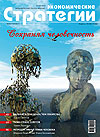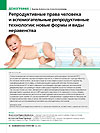Human Reproductive Rights and Assisted Reproductive Technologies: New Forms and Configurations of Inequality
The paper is devoted to consideration of assisted reproductive technologies (ART) in the context of social changing. ART raise many medical, social, ethical, political and religious questions, often leading to controversial and sometimes inaccurate opinions about the outcomes of pregnancies resulting from these techniques. We analyze the process of ART implementation in Russia. Such consequences as new types of social inequality and new forms of social mobility, new aspects of kinship, transforming traditional social roles are focus of our interest. Using and distribution of ART do not simply reflect the existing structure of the socio-economic differentiation, but produce new configurations of inequality both globally and within countries, particularly in the area of reproductive rights and reproductive health. Access to ART depends on social status, gender, economic status, religious beliefs and national characteristics for different social groups. We also can speak about reproductive bioeconomics where the reproductive labor e.g. surrogate motherhood is a central element and reproductive tissues are main objects to be exchanged. ART may be considered a great example how modern science and technology may influence social relations and social practices.



